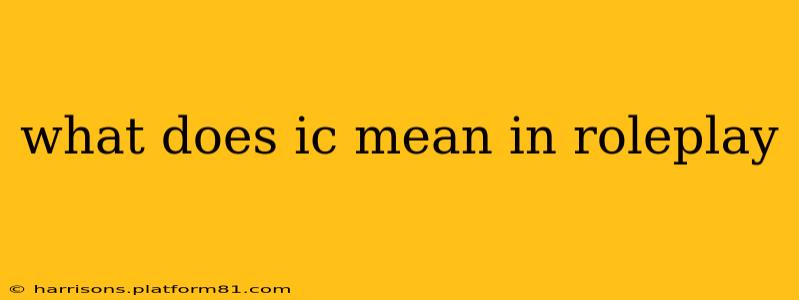What Does IC Mean in Roleplay?
In the world of roleplaying, whether online or in person, understanding the shorthand is key to seamless communication and immersion. One common abbreviation you'll encounter is "IC," which stands for In Character. This term indicates that the following statement or action is performed by the roleplayer as their character, staying within the established personality, backstory, and limitations of that fictional persona.
It's the opposite of "OOC," which means Out of Character. OOC communication is used for meta-discussion, such as clarifying rules, discussing plot points, or simply chatting outside the roleplay narrative.
Let's delve deeper into understanding IC and its implications:
What are some examples of IC actions and speech?
Imagine a roleplay scenario set in a fantasy world. Here's how IC and OOC might appear:
IC Example:
Player 1 (as Elara, a fierce warrior): "I charge forward, sword raised high! Prepare to face my wrath, vile creature!"
This entire statement is IC, as Elara, the warrior character, is speaking and acting within the context of the roleplay story.
OOC Example:
Player 1 (as themselves): "Okay, I think we need to adjust the battle strategy. Maybe we should focus on using Elara's magic instead of just her sword?"
This is OOC because Player 1 is stepping outside their character to provide feedback and suggestion regarding the roleplay itself.
Why is it important to distinguish between IC and OOC?
Clearly distinguishing between IC and OOC is crucial for several reasons:
-
Maintaining Immersion: Keeping IC and OOC communication separate helps maintain the roleplay's atmosphere and prevents confusion. Blending the two can break the illusion of the fictional world.
-
Clarity and Understanding: Knowing whether a statement is IC or OOC helps other players understand its intention and context within the roleplay.
-
Conflict Resolution: If a dispute arises, knowing which actions were IC versus OOC can be vital in determining responsibility and resolving conflicts fairly.
-
Respecting Boundaries: Some players establish specific boundaries for their characters. Understanding the IC/OOC distinction helps respect those limits.
What if there's confusion between IC and OOC actions?
If there is confusion, a player can explicitly state whether something is IC or OOC to remove ambiguity. For example, a player might say, "(OOC) Just to clarify, my character wouldn't do that." This ensures everyone is on the same page.
How do IC and OOC impact roleplaying experiences?
Using IC and OOC correctly significantly enhances the roleplaying experience, fostering creativity, immersion, and a collaborative storytelling environment where everyone understands their role and contributions. The seamless shift between IC and OOC is a sign of a seasoned roleplayer. Therefore, mastering this distinction is key to thriving in any roleplay community.
